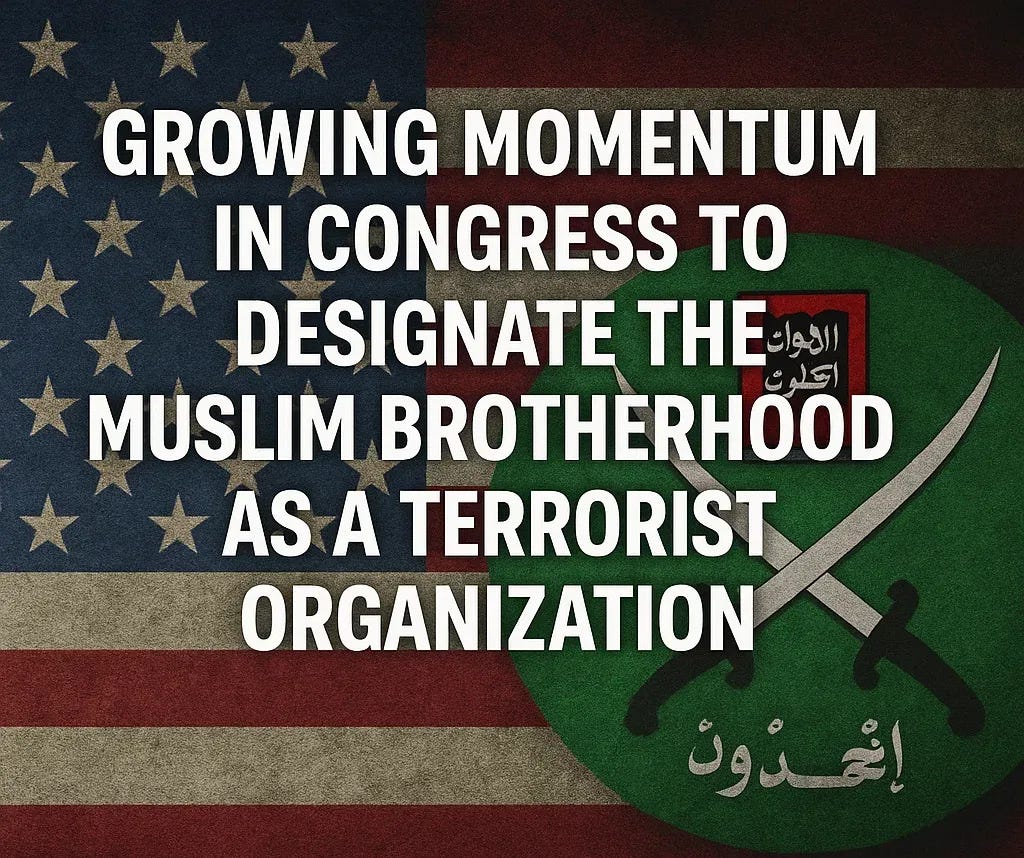Growing Momentum in Congress to Designate the Muslim Brotherhood as a Terrorist Organization
Momentum is growing in Congress to designate the Muslim Brotherhood as a terror org — the push follows a recent antisemitic attack in Colorado, with a suspect found to support Brotherhood ideology
A recent article in The Free Beacon has reignited critical discussions in Washington about the need to designate the Muslim Brotherhood as a terrorist organization. The push, which has gained traction in the wake of Donald Trump’s recent Middle East trip, is now backed by key lawmakers, intelligence officials, and international allies who see the Brotherhood as a serious threat to both American and global security.
This growing urgency is further fueled by disturbing incidents, such as the recent violent anti-Semitic attack in Colorado. Mohamed Sabry Soliman, a suspect charged with attempted murder and other crimes after a firebombing at a pro-Israel protest, was found to have a social media footprint that suggests he was inspired by Muslim Brotherhood radical ideology. His online activity, which includes following pro-Islamist and jihadist figures, highlights the immediate dangers posed by such extremist beliefs and the potential for radicalization among individuals in the U.S., underscoring the need for stronger counterterrorism measures.
Muslim Brotherhood: A Global Threat
The Muslim Brotherhood, founded in 1928 in Egypt, has become a transnational force, infiltrating many regions under the guise of political Islam. Despite presenting itself as moderate, the group has long maintained ties to violent extremist organizations like Hamas. This connection makes it a significant global threat, one that directly impacts U.S. national security and the security of its allies.
International Support and Backing
Several Arab nations, including Saudi Arabia, Egypt, and the UAE, have already designated the Brotherhood as a terrorist entity, and many in the U.S. Congress are advocating for the same designation. Additionally, Jordan recently issued a blanket on the Muslim Brotherhood for allegedly planning terror attacks in the Kingdom.
Senator Cruz is poised to reintroduce the Muslim Brotherhood Terrorist Designation Act, which he has championed throughout his career. In a statement, he pointed to the group’s use of political violence, particularly through its association with Hamas, and stressed that such a designation is now more urgent than ever. In response, Congressman Randy Fine (R-FL) voiced his support for the effort, asking if Cruz’s bill had a sponsor in the House, a move signaling enthusiasm and potential backing for the legislation.
This latest initiative gained further attention following a briefing organized by the Institute for the Study of Global Antisemitism and Policy (ISGAP), where congressional staff discussed potential strategies to curb the Muslim Brotherhood's influence within the U.S.
Bipartisan Support for Counterterrorism Efforts
Key U.S. lawmakers, including Rep. Ashley Hinson (R-IA), are also aligning with this effort, noting that the push aligns with broader counterterrorism strategies, including the Trump administration's approach to confronting Iranian-backed terror factions. Even Congressman Jared Moskowitz (D-FL) has joined the call, urging the President to investigate the Muslim Brotherhood's connections and designate it as a Foreign Terrorist Organization (FTO). Moskowitz cited the group’s extensive history of promoting extremist ideologies, which continues to fuel global instability.
European Countries Begin to Recognize the Threat
As the U.S. contemplates action, European nations are increasingly recognizing the threat posed by the Muslim Brotherhood. A recent French government report highlights the Brotherhood’s growing influence within the country, revealing how it has embedded itself in Muslim communities through a secretive core while projecting an image of moderation. The Brotherhood’s operations in France, particularly through organizations like Musulmans de France, involve controlling mosques and cultural centers, where it promotes its extremist ideology under the guise of peaceful coexistence.
The European Leadership Network (ELNET) has also reported the presence of organizations connected to Hamas operating in France and other parts of Europe. As an offshoot of the Muslim Brotherhood, Hamas has been a focal point of European counterterrorism efforts, further underlining the Brotherhood's role in fostering extremist activity.
Red Flags Missed: Mohamed Sabry Soliman and the Digital Ecosystem of Radicalization
One of the more alarming examples of the Brotherhood's influence is the recent case of Mohamed Sabry Soliman, a suspect involved in a violent anti-Semitic attack in Colorado. Soliman’s disturbing digital footprint, which was revealed in an X thread by Travis Hawley, suggests he was influenced by radical Muslim Brotherhood ideology. His online activity, which includes following pro-Brotherhood and jihadist figures, underscores the spread of such extremist beliefs and raises concerns about the radicalization of individuals within the U.S.

Additionally, a video uncovered by MEMRI TV shows Soliman recording a message before his firebombing attempt at the pro-Israel protest in Boulder, where he declared that "Jihad is more beloved than my family" and that "Allah is greater than Zionists and America." This chilling declaration highlights the ongoing risk posed by these radical ideologies and the potential for violent acts inspired by such beliefs.

Addressing the Threat Within U.S. Borders
The Muslim Brotherhood's influence is not limited to foreign lands. Many of its affiliated groups in the U.S. may present themselves as peaceful and focused on political or social issues, but they remain part of a broader ideological network tied to violent extremist organizations. Designating the Brotherhood as a terrorist organization would give the U.S. government the tools needed to disrupt its operations and prevent its influence from spreading within American borders.
Designation Options and Challenges
As lawmakers grapple with the logistics of such a designation, options include classifying the Brotherhood under the Foreign Terrorist Organization (FTO) list or the Specially Designated Global Terrorist (SDGT) list, both of which would impose significant financial penalties. However, these efforts are likely to face resistance, particularly from lobbyists and foreign interests linked to the Brotherhood, such as the Qatari regime.
Despite these challenges, there is a clear bipartisan recognition of the need for decisive action. The question now is whether Congress can unite around a strategy that disrupts the Brotherhood’s operations and limits its ability to radicalize and recruit, both abroad and within the United States.




OMG, I thought it was already! What is taking them so long?????????? Yes, CAIR, and all their off shoots, including SJP. Get. Rid. Of. All. Of. Them.
About time. They’ve been living free and easy in this country, right under our noses, for a long, long time.